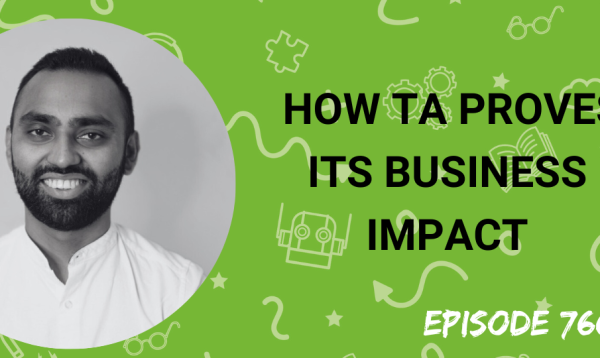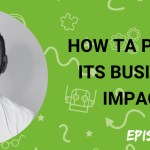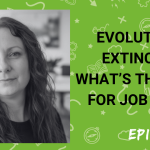In recent weeks we’ve had a few discussions on this show about the need for employers to find and nurture people with different mindsets from their existing norms. Digital transformation and exponential business change mean that companies need to be thinking very differently about talent.
One of the key global thought leaders helping employers do this is Harvard Business School, Professor Francesca Gino. Francesca focuses on the psychology that drives people’s decisions at work and is the author of the best selling book “Rebel Talent”.
In the interview we discuss:
- Why companies need rebel talent and to encourage rebel behaviour
- The 5 characteristics of rebel talent
- Rule-breaking as a constructive force
- Recruiting, nurturing and developing rebel talent
- How we can all be more rebel
Subscribe to this podcast in Apple Podcasts
Transcript:
Matt Alder [00:00:00]:
Support for this podcast is provided by Smart Recruiters, the hiring success company Smart Recruiters offers enterprise grade recruiting software designed for hiring success. Move beyond applicant tracking with a modern platform that provides everything you need to attract, select and hire the best talent. From candidate relationship management to programmatic job advertising, recruitment, marketing, collaborative hiring and embedded artificial intelligence experience. A talent acquisition suite with intuitive user experience that candidates, hiring managers and recruiters all love. Leading brands like Bosch, IKEA, LinkedIn and visa use Smart Recruiters to future proof talent acquisition and expand their businesses globally. Visit smartrecruiters.com to find out how you can achieve hiring success as well.
Matt Alder [00:01:14]:
Hi everyone, this is Matt Alder. Welcome to episode 183 of the Recruiting Feature podcast. In recent weeks we’ve had a few discussions on this show about the need for employers to find and nurture people with a different type of mindset. Digital transformation and exponential business change mean that employers need to be thinking very differently about talent. One of the most respected global thought leaders helping employers achieve this is my guest this week, Harvard Business School Professor Francesca Gino. Francesca focuses on the psychology that drives people’s decisions at work and is the author of the best selling book Rebel Talent. Enjoy the interview.
Matt Alder [00:02:01]:
Hi Francesca, and welcome to the podcast.
Francesca Gino [00:02:01]:
Hi. Thank you so much for having me.
Matt Alder [00:02:03]:
An absolute pleasure to have you on the show. Could you just introduce yourself and tell everyone what you do?
Francesca Gino [00:02:09]:
Absolutely. My name is Francesca Gino. I am a professor at Harvard Business School and I’m interested in the psychology that drives our decisions at work. And recently I wrote a book called Rebel Talent where I get to explore, explore some of the decisions that we make at work that might not lead to great happiness, performance and innovations. And how is it that we can do better on that front?
Matt Alder [00:02:34]:
Now, I’ve read the book and it’s, it’s great. It’s a really interesting topic and you cover it with some great thinking and some great examples. For people who haven’t read the book, could you just give us a quick synopsis? Tell us, tell us a little bit about what it’s, what it’s about.
Francesca Gino [00:02:48]:
The book is about rule breaking as a constructive rather than a destructive form. We often think about rebels as people to avoid or people that we don’t appreciate in our businesses. We tend to think of Rebel as the annoying colleague that gets in our way as we’re trying to get things done. And what I wanted to suggest is that there are also rebels that are quite constructive and create positive change in organizations. So rebels are people who challenge the status quo in ways that could in fact, lead to more innovative thinking and better performance inside of the organization. And to me, given the world we live in today, a world that seems to be ever more uncertain, with problems that comes our way that are even always more complex, what we need in terms of talent in organization is people who are more rebellious. Because the rebel, in a sense, I’m daunted by novel situations and idea, is able to adapt to change as a matter of course.
Matt Alder [00:03:51]:
Obviously, the book is full of examples of rebel talent. Could you perhaps share one of those?
Francesca Gino [00:03:56]:
One of the example that was very inspiring for the book is the example of a chef, an Italian chef called Massimo Bottura, and he owns a restaurant called Usuria Francescana, that is a three Michelin star restaurant that in 2016 became the best restaurant in the world. And in 2018, they were again back at the top of the list. And the reason why I find this story inspiring is because he went to a context, traditional Italian dishes, and decided to reinvent these dishes. And he came up with rather innovative way of thinking about traditional dishes. And I don’t know how much you know about Italians, but being a native Italian, I can tell you that two things are true. One, there are lots of rules when it comes to cooking, from the way you pair a certain type of pasta to a certain type of sauce, all sorts of rules that need to be followed. And second, we cherish our old ways, especially when it comes to recipes that have been passed on for centuries. And so here you have a chef who went to those traditions and started asking question, why is it that we cook dishes this way? Maybe it made sense 20 years ago, 30 years ago, but not today. And so his story is very powerful to me because he had the courage to create change in a context where we accept the status quo, we accept traditions. And so throughout the book, I came across all sorts of stories of rebels like him, people who created positive change in their organizations or in their life more broadly by being a little bit more rebellious, thinking through traditions a little bit differently.
Matt Alder [00:05:35]:
Now you break down the characteristics or the recipe, if you like, for rebel talent. Could you talk us through what the ingredients are of this kind of talent, what the charact?
Francesca Gino [00:05:48]:
Rebels tend to have five talents, independent of the type of industry they work for or the type of role that they have. One is the talent for novelty. So rather than going for what’s familiar and comfortable There are people who tend to go for the uncomfortable and unfamiliar, so they always stretch themselves doing things that are new. They also have a talent for curiosity. So, so rather than taking the usual way of working for granted, they ask questions, they explore, as we used to do when we were little kids. They have talent for perspective. So rather than coming to situations or problem, looking at them from one specific angle, they keep the perspective open, always trying to stay open minded. And then they have a talent for diversity. So they push back on social roles that society passes upon us. And they really think throughout best leverage differences with others. And finally, they have a talent for authenticity. What that means is that they stand out, they express their view, their contribution, their preferences, without worrying too much about the fact that others might be thinking differently about a decision or a problem.
Matt Alder [00:07:05]:
And why do you think it’s so important that companies should be sort of looking for this type of talent and encouraging it within their businesses?
Francesca Gino [00:07:14]:
Often organizations ask me or leaders ask me, what is the perfect percentage of rebels? What’s the magical numbers of rebels that I need in my organization? And my answer is always the same. I always say 100%. And the reason for 100% is twofold. First of all, when you think through the talents that I mentioned, none of them is scary or particularly threatening. And so as leaders and as, as employees, we need to be able to bring those talents out more often. But second, and more importantly, when you look at the evidence, and there is a lot of it, when we allow people to bring those talents out, they feel very differently about the job that they have. For most people out there, you can look at the Gallup data, you can look at data that my colleagues and I have collected. Work simply sucks. It’s a source of frustration rather than being a source of joy. And rebels are people who are fully engaged in the work that they do, they’re fully satisfied, and thanks to that, they’re able to stay creative, they’re able to perform at higher levels. So from a business perspective, there are all sorts of good reasons why we should bring more rebellion into our own organizations.
Matt Alder [00:08:29]:
So much of the, the audience for this show are either working in recruiting or working in hr. What would your advice be to them in terms of from a recruitment perspective, being able to spot these characteristics, and for an HR perspective, being able to support this kind of talent within the business.
Francesca Gino [00:08:49]:
So when I think about hiring practices, if you’re hiring for a rebel, what I would do is think specifically about these five different talents. And so you can take curiosity, which in a Sense is the turbocharger in thinking about inspiring and also encouraging other talents. And if we’re hiring on curiosity, then we need to have some questions that get at it. So questions like asking a person what their interests are outside of work, it’s a great question to try to understand whether this person has broader interests, whether they’re curious or asking the question of when was the last time that you find yourself really wanting to find an answer to something that maybe was not entirely related to your work or to your job and how did you go about that process? Or last time you traveled to a different location for work, did you have dinner in the hotel or did you explore the city? These are the type of questions that allow us to understand whether a person is more or less curious, naturally. And then if you take other talents for authenticity, I think it’s actually quite easy to figure it out. Often people who run interviews ask the question, what’s your major weakness? And often the answer that you get is, I’m too much of a perfectionist or something similar to that. That’s a great clue that probably the person is not being very authentic. And so can you actually talk about your weaknesses in a way that is genuine and for perspective, maybe give them a problem or an issue that your organization is struggling with? There is a CEO and founder of a startup in New York called Castafire that does just this. So when she brings in new people, she gets to talk to them, she gives them problem that the organization is facing, and then she tries to pay really close attention to their answers. And she’s trying to understand how these people, these candidates, are thinking through the answer and whether that is a different way from the way she thinks through the answer. So basically she’s hiring people she knows are thinking differently from her and the rest of the team. And in a sense she’s hiring people who she know she’s likely to disagree with. And so those are all questions or little insights in terms of how is it that we figure out whether these people are bringing these talents versus not. And then there are all sorts of interesting small changes that we can make on a day to day basis once they’re actually in the business, in the organization. So take authenticity. With my colleagues, we worked with a variety of organizations where what we decided to do is do a little intervention right at the moment where the person was joining the company. And so we gave new recruits half hour on the first day of the welcoming process to think about what’s unique about them, in what ways they feel authentic and how is it that they could bring that authenticity out in the work that they do? And that moment of reflection was actually quite important. And it translated into better integration with the rest of the team, with the rest of the organization. It translated into better performance on the job. It translated into a willingness to stay with organizations for longer and experiencing less burnout when the job got tough. And so it’s through small interventions like this one that I think HR leaders can really make a meaningful difference in terms of encouraging these talents on a day to day basis.
Matt Alder [00:12:32]:
So from a, from a, from an individual perspective, how can people be more rebel? How, how can we kind of embrace, embrace our own rebel talent?
Francesca Gino [00:12:42]:
So to me, living like a rebel is almost a matter of trying little things. So in my own life, I tried red sneakers in formal settings. And you’re gonna have to read the book if we want to make sense of why that is. But it also takes a broader commitment to exploring ways of being in the world that might at first feel wrong or possibly even destructive. It feels uncomfortable to try out these talents or to let them come out because in a sense, we’re fighting against our own human nature. And in order to help people take that journey, I created a test. It’s a test that people can find online@rebeltalents.org and it’s called the Rebel test. And it takes about 7, 8 minutes to take. It’s free. And once you take the test and answer the question, you’re going to receive feedback on the type of rebel you are. And if people come out as pirates, it’s actually a very good thing. So it’s a good starting point. And then I created some feedback for the different rebel types. And so I did that with the intention of helping people start this more rebellious journey, given that there are so many benefits that come with it.
Matt Alder [00:14:02]:
Fantastic. And I will be taking that test as soon as we, as soon as we finish this interview. Final question. So in sort of doing all the research for the book, what was the thing that surprised you most?
Francesca Gino [00:14:16]:
One of the things that surprised me most was to see rebelliousness across the board. So it’s not that you need to be in a particularly creative environment or in a particularly innovative organizations in order for rebelliousness to produce the good effects that we talked about. In fact, some of the organizations that I visited and studied as I was working on these projects are very much organizations that, that are not like that fast food chain in the middle of tenancy call centers in India, places where you wouldn’t expect people to bring out their talents often because the job is very scripted or because there is a clear focus on efficiency and executing to excellence. And so my intention and the surprise was to see that no matter what the context is, there is always the possibility in small step to bring out curiosity in people, to bring out novelty, authenticity, perspective, diversity, that all these talents can exist across contexts.
Matt Alder [00:15:24]:
So where can people find you and where can people find the book?
Francesca Gino [00:15:28]:
So there is a book website called rebeltalents.org and there is a lot of information about me. There is also more information about the book and so I’m hoping that people are going to check that out.
Matt Alder [00:15:39]:
Francesca, thank you very much for talking to me.
Francesca Gino [00:15:41]:
It was such a pleasure. Thank you for having me on the show.
Matt Alder [00:15:44]:
My thanks to Francesca Gino. Before you go, I just wanted to let you know about an event coming up which will be of particular interest to those of you who are working in in house recruitment. On May 9, thousands of in house recruiters, industry visionaries and disruptors will gather in Manchester, England for the return of In House Recruitment live. This one day exhibition and conference will present an abundance of opportunities for you and your team to push boundaries and discover new and better ways of recruiting. You can find out more and register for your ticket by going to live.inhouserecruitment.co.uk Manchester. That’s live.inhouserecruitment.co.uk Manchester. You can subscribe to this podcast in Apple Podcasts or via your podcasting app of choice. The show also has its own dedicated app which you can find by searching for Recruiting Future in your App Store. If you’re a Spotify user, you can also find the show there. You can find all the past episodes@www.rfpodcast.com. on that site you can subscribe to the mailing list and find out more about working with me. Thanks very much for listening. I’ll be back next week and I hope you’ll join me.








